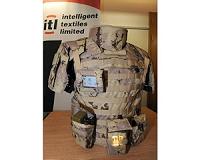| . |  |
. |
Paktika Province, Afghanistan (SPX) Jan 18, 2011 Soldiers from Task Force Currahee are the first in eastern Afghanistan to test the new smart phone, beta-version of a voice language translation program to be fielded in early January. Developed by the Defense Advanced Research Projects Agency, the research and development office for the U.S. Department of Defense, the new program, called Translation System for Tactical Use (TRANSTAC), is an application that provides sentence and phrase translation on an easy-to-use, hand-held smart phone. The smart phone allows the Soldiers, part of 4th Brigade Combat Team, 101st Airborne Division, to speak into the phone and have their words immediately translated into another language. The smart phones have the capability to translate from one language to another and give both speakers the ability to have their sentences translated back and forth, allowing two people speaking different languages to hold a conversation. The language translation smart phones don't have actual phone connectivity capabilities, but the program runs as an application on the operating system of the smart phone. The phones record every statement made by both speakers, log the conversation with audio and text playback options, take photos and record video. "This is just the six-month beta-testing phase," said Capt. David McKim, TF Currahee assistant brigade intelligence officer. "We will be distributing a handful of the devices to each of our battalions for testing on the job, and out on missions with the local Afghan people. "Our goal is to determine just how reliable and how easy to use these devices are in a field environment," said McKim. "The idea is to give Soldiers the ability to communicate, even if it is just on a basic level, with the Afghan people when an interpreter isn't available." After six months of testing, reports and updates from the units and Soldiers using the phones will reveal what did and didn't work and any improvements that need to be made. The program currently has a basic set of vocabulary for both Dari and Pashto, the languages spoken in Paktika Province. "The intent is to place the devices in the most active and beneficiary units in order to gauge the devices' capabilities and use on mission," said McKim. "This is just another way for the U.S. Army to adapt and improve on current technology in order to better gather and disseminate information." Representative Soldiers from each battalion and company attended the one-day, train-the-trainer class on the maintenance of the device and use of the translation program, Jan. 5-7. These Soldiers will then train their units on the device and its uses. Fielding dates for the TRANSTAC smart phones are pending final assessment and unit allocation.
Share This Article With Planet Earth
Related Links US Army The latest in Military Technology for the 21st century at SpaceWar.com
 Future Defence Kit Showcased
Future Defence Kit ShowcasedLondon, UK (SPX) Jan 18, 2011 Technologies which could deliver benefits to the front line of the future were shown off by Small and Medium-Sized Enterprises (SMEs) who have received MOD research contracts. The futuristic kit was presented at an innovation showcase at the Department for Business, Innovation and Skills in London. Defence Minister Peter Luff announced at the event that nine new contracts, worth GBP5 ... read more |
|
| The content herein, unless otherwise known to be public domain, are Copyright 1995-2010 - SpaceDaily. AFP and UPI Wire Stories are copyright Agence France-Presse and United Press International. ESA Portal Reports are copyright European Space Agency. All NASA sourced material is public domain. Additional copyrights may apply in whole or part to other bona fide parties. Advertising does not imply endorsement,agreement or approval of any opinions, statements or information provided by SpaceDaily on any Web page published or hosted by SpaceDaily. Privacy Statement |